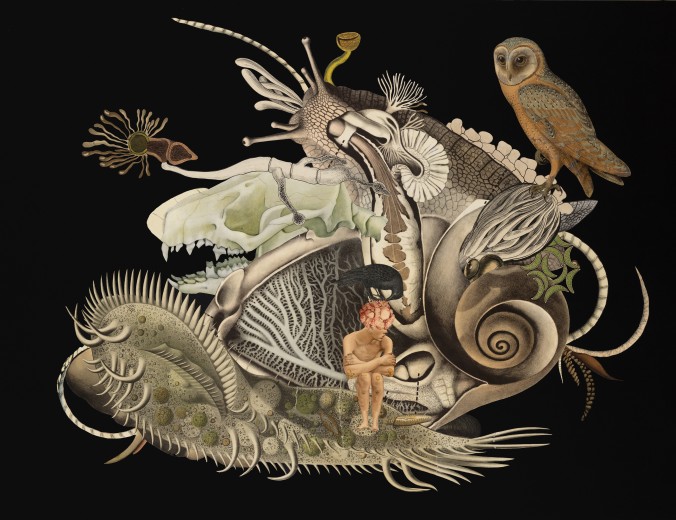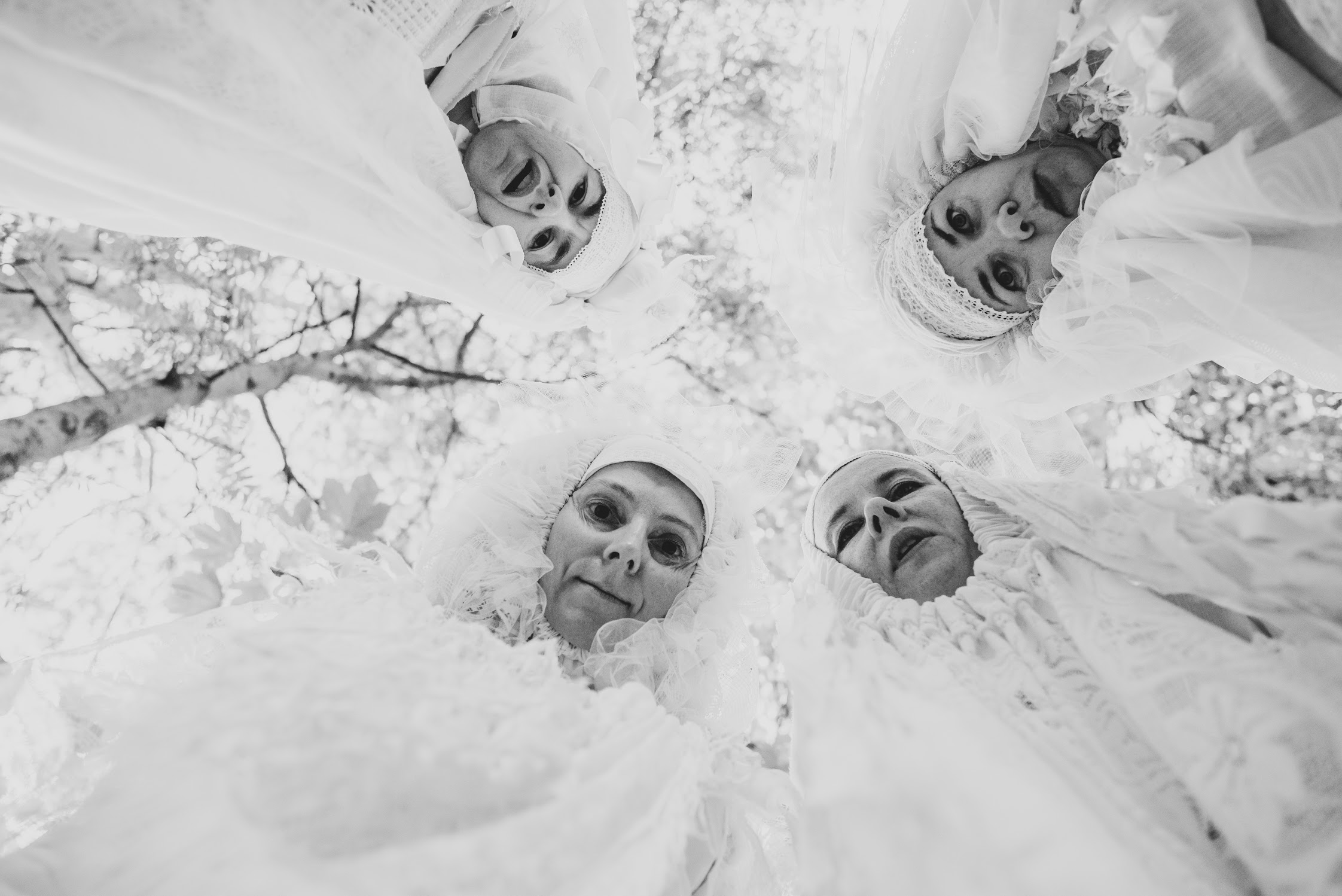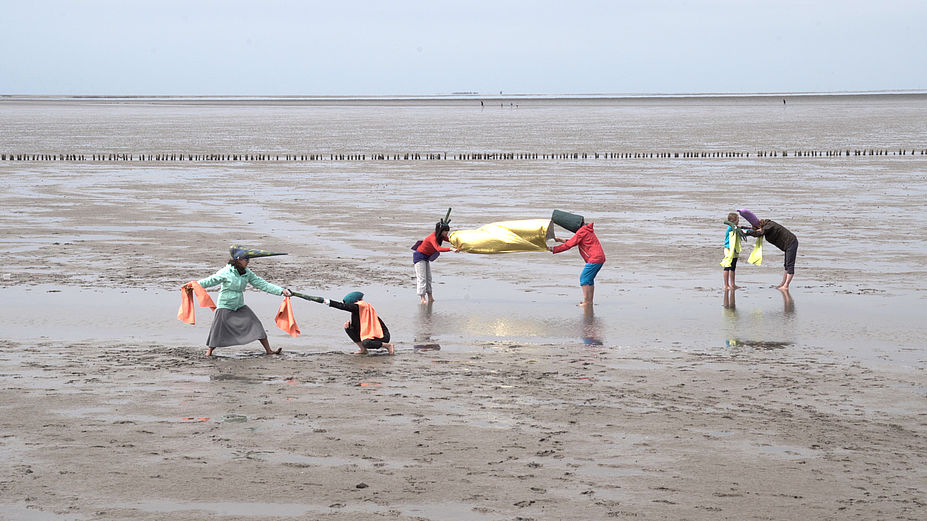pandemic summer guide
A selection of 2020 exhibitions and art projects by artist, curator, activist and editor of the online art platform Magazyn RTV Zofia Nierodzińska.
The Penumbral Age. Art in the Time of Planetary Change / Museum of Modern Art Warsaw / 05.06.2020–13.09.2020
The Penumbral Age. Art in the Time of Planetary Change is an exhibition devoted to ecologically conscious art. The title of the exhibition was taken by the curators (Sebastian Cichocki and Jagna Lewandowska) from the book The Fall of Western Civilization. A Look from the Future by Naomi Oreskes and Erik M. Conway, published in 2014. In the book ‘the period of the penumbra’ is contemporaneity seen by a protagonist from the future as an anti-intellectual time when scientific knowledge is increasingly ignored. The exhibition, involving 71 artists and eight collectives, is not based on scientific facts and statistics, but on imagination and emotions. The text accompanying the exhibition includes a saying by Nicholas Mirzoeff, that ‘we must “unsee” how the past has taught us to see the world, and begin to imagine a different way to be with what we used to call nature’.
[ 1 ]
1. Nicholas Mirzoeff. How to See the World. Penguin Books, 2015.
The role of the art museum in this process is as a place where the required mental changes are catalysed.
The Penumbral Age is an exhibition that links land art – the western art movement from the turn of the 1960s and 1970s – with the art and thought of Pakistani artist and activist Rasheed Araeen, who strives for ‘global art of planetary change’. The ambitions of the curators are therefore not limited to local contexts, but cover the whole Earth. The exhibition can be seen as a ‘who is who’ parade of the environmental art scene. We are offered an overview of the classics of the genre from Robert Long to Robert Morris and Agnes Denes, through ‘protest art’ in an institutional package (Suzanne Husky and Akira Tsuboi) to esotericism (Shana Moulton and Nick Hallett, Teresa Murak, Czekalska and Golec).
The introduction of non-western perspectives to the exhibition widens the spectrum of the classics, Such perspectives are brought to bear by Manumie Qavavau, who draws inspiration from the traditional art of the Innuits, Jonathas de Andrade, who parodies western ideas about the inhabitants of Brazil, Ice Stupa Project in Ladakh (India-artificial glaciers created by engineer Sonam Wangchuk), INTERPRT collective and work by Frans Krajcberg, a Polish-born artist who settled in Brazil after World War II to lead a hermit’s life until his death in 2017.

The global ambitions of the exhibition at the Museum on the Vistula may seem exaggerated, but it is interesting to observe the search for the identity and the role of the institution in times of crisis, not only as a temple where the silhouettes of engaged artists are admired, but, more importantly, as a place whose everyday functioning is based on the principles of social and climate justice.
Magical Engagement / Arsenal Municipal Gallery Poznan / 18.09.2020–01.11.2020
Magical Engagement is another exhibition, the opening of which has been postponed due to the health crisis (the opening is now scheduled for September 18). Its theme, comparable to The Penumbral Age, is the climate crisis or, more precisely, the way in which art and the municipal institution, filled with the voices of human and non-human actors, resonate with that crisis. The exhibition is divided into three routes (artistic, activist and educational) and it is committed to movement and experience as opposed to static contemplation. It includes guided tours (they will probably be online, at least in part, due to pandemic regulations) with representatives of climate movements such as Extinction Rebellion, or more local initiatives such as the Kąpielisko Collective or Poznan Against Hunters. In the description of the project we read that the events that are included in the exhibition are intended to remove the ‘spells of everyday capitalism’, to show the broken bonds between the social world and what is commonly regarded as ‘natural’. The title of the exhibition refers to that which has been displaced from the world by the logic of capitalist anthropocene, i.e. magic, ritual, memory of human and non-human ancestors, compassion and relationality.

The exhibition participants include professional artists (Ewa Ciepielewska, Małgorzata Gurowska, Cecylia Malik, Daniel Rycharski), the folk artist Jadwida Aniola, who presents her handmade ornamental decoration, and artist and activist Michal Chomiuk, who has gathered stories of evil spirits, rusalkas, nightmares and women herbalists in the Polish regions of Podlasie and Lublin. The guides (not the curators) of Magical Engagement declare that they practice art in action and activism in magic. The social is not enough for them, so they define engagement broadly, co-creating hybrids and collectives, recycling and upcycling rituals, coming closer to the earthly humus and moving away from humanus. One of the collectives invited to the exhibition, the Inter-species Community, encourages active unlearning of harmful human habits, overcoming speciesism through care, e.g. by spreading and supporting the growth of plants in homes, institutions and between pavement slabs.
HKW New Alphabet School #Caring / Haus der Kulturen der Welt Berlin / Workshops: June 12,13,14.2020 and the ongoing online programme
The New Alphabet School is a collaborative self-organised entity within the institution (Haus der Kulturen der Welt) that aims to explore critical and affirmative research practices. It enables research outside academic, disciplinary or genre constraints, where learning and unlearning methods can be practised and where care and shared responsibility are more valued than criticism. Its three-year programme, started in 2019, divides into a number of topics: unlearning, translating, situating, coding, transmitting, caring, instituting, community, healing, weaving, survivance and communing. Each of them is shaped by a different group of art practitioners and researchers: https://newalphabetschool.hkw.de/.

The #Caring part of the three-year program, which would have involved intimate encounters, workshops, shared cooking and joint travel, cannot now go ahead as planned. Instead, there will be three-day online event starting on Friday, June 12, live-streaming a journey that explores the various notions of care, followed by a conversation on the historical aspects of care and reproductive work between two feminist authors: Elke Krasny and Helena Reckitt. Multi-vocal, intersectional queer and black feminist perspectives will be developed in series of workshops, including one with Edna Bonhomme, who poses the highly topical question: When does a person consider themselves sick and how do (post)colonial and (post)migration residues shape the way people archive, narrate and navigate care? There was and is an ongoing radicalisation of epidemics, which results in very disparate outcomes, leaving some to fall ill and others not. The practice of community building based on care is informed by the perspectives of feminism, and (post)colonial and disability studies. It is an activity directed at shaping more tender futures.
#Caring is understood here as ‘diverse ways of relating and living, of perceiving and making, both as a society and as individuals engaged in mutual responsibility, attentiveness and responsiveness’. The practice of care means an ethical as well as a political choice. It situates the human being as a caretaker, a custodial figure, who cares for, repairs and maintains the broken planet.
- Nicholas Mirzoeff. How to See the World. Penguin Books, 2015.